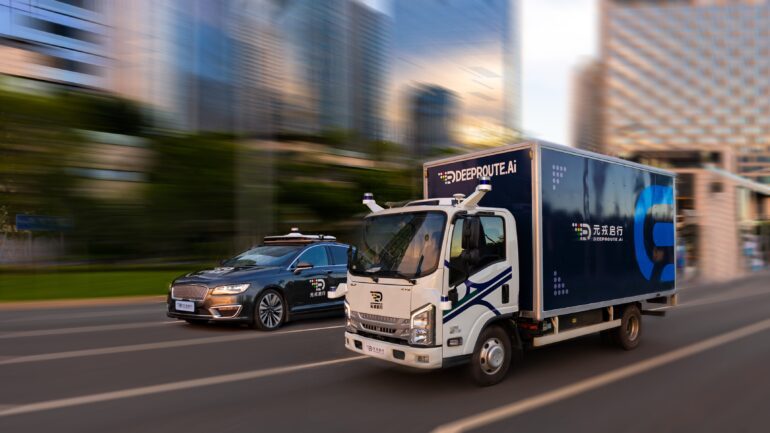TL;DR:
- Deeproute.ai, backed by Alibaba, aims to establish operations center in Germany by 2024.
- The company plans to introduce its production-ready autonomous driving solution in Germany and expand to other European markets.
- Drive 3.0, the innovative solution, boasts features such as valet park assist, priced at $2,000, supported by Chinese lidar suppliers and Nvidia’s technology.
- Deeproute’s strategic move aligns with the trend of Chinese mobility startups setting up in Germany.
- Similar actions by Momenta and Nio illustrate the impact of such presence on collaboration with European automakers.
- Deeproute transitions focus from robotaxis to production-ready car road testing, building relationships with OEMs.
- The establishment of a business development team in Germany enhances Deeproute’s engagement with local automakers and smart driving mass production.
Main AI News:
In an ambitious stride towards global expansion, Deeproute.ai, the Shenzhen-based trailblazer in robotaxi technology, has firmly set its sights on Europe. Bolstered by a staggering $350 million in funding and a workforce exceeding 500 individuals across the globe, Deeproute.ai aims to establish an operations hub in Germany by 2024. This calculated move echoes the growing trend of Chinese innovators establishing a tangible presence in Germany, a nation synonymous with automotive excellence and home to some of the world’s most renowned automakers.
The announcement of this pivotal plan was unveiled during the prestigious International Motor Show Germany, held in Munich this week. This gathering showcased a notable presence of pioneering Chinese mobility enterprises, and amongst them, Deeproute.ai stood tall, backed by tech titan Alibaba. Not content with mere physical presence, Deeproute.ai is poised to deploy its production-ready autonomous driving solution across German thoroughfares, a development slated for the upcoming year, followed by a subsequent expansion into other European markets.
Branded as “Drive 3.0,” this revolutionary solution elegantly eschews the reliance on HD maps, elevating the driving experience with features such as valet park assistance. The pièce de résistance lies in the attractive price point of $2,000, an achievement partly attributed to the judicious collaboration with competitively priced Chinese lidar suppliers. A key enabler of this breakthrough is Nvidia’s Drive Orin system-on-a-chip, embodying cutting-edge technology.
While specifics surrounding the forthcoming “operations center” remain under wraps, Deeproute.ai, in correspondence with TechCrunch, revealed its intention to assemble a dynamic business development team within the center’s walls. Although the exact host city remains undisclosed, potential locales abound, promising an exciting chapter for both Deeproute.ai and the chosen German urban landscape.
Drawing insights from historical precedent, it’s worth noting that Deeproute’s Suzhou-based contender, Momenta, astutely established an office in Stuttgart two years ago. This strategic move paved a path of symbiotic collaboration with its investor, Mercedes-Benz, and forged links with European OEMs. Notably, the discerning presence of Chinese electric vehicle upstart Nio in Germany further exemplifies this trend, with an innovation center in Berlin and a design facility in Munich, bolstered by the striking “Nio House.”
Initially, Deeproute embarked on its journey with an ardent focus on Level 4 driverless technologies to propel its robotaxis. Yet, the evolving landscape prompted the company to embrace a spectrum of driving solutions catering to auto partners, heralding a diversification strategy that promises to augment immediate cash flow. Notably, Deeproute garnered significant momentum by orchestrating over 800,000 passenger rides by the close of 2022, predominantly facilitated by its fleet of robotaxis in key Chinese metropolises.
The imminent establishment of a German foothold aligns harmoniously with Deeproute’s strategic pivot towards expanding its OEM clientele. Seres and Geely, already part of the fold, form the initial spectrum of Deeproute’s partners. The deployment of a business development team on German soil signifies Deeproute’s intent to foster closer connections with local automakers, facilitating the realization of smart driving mass production and other collaborative pursuits. As the contours of this transformational narrative unfold, the industry watches with bated breath, waiting to witness if more Chinese robotics titans will trace Deeproute’s trajectory into the heart of Germany’s automotive realm.
Conclusion:
Deeproute’s strategic move to extend its operations to Germany signifies a significant shift in the automotive landscape. As the company introduces its innovative autonomous driving solution to European markets, it demonstrates a proactive approach to collaboration with established automakers. This expansion not only strengthens Deeproute’s foothold in the industry but also sets a precedent for other Chinese robotics companies to explore opportunities in the European market. The convergence of cutting-edge technology and strategic partnerships has the potential to reshape the future of mobility and drive further innovation across the automotive sector.

